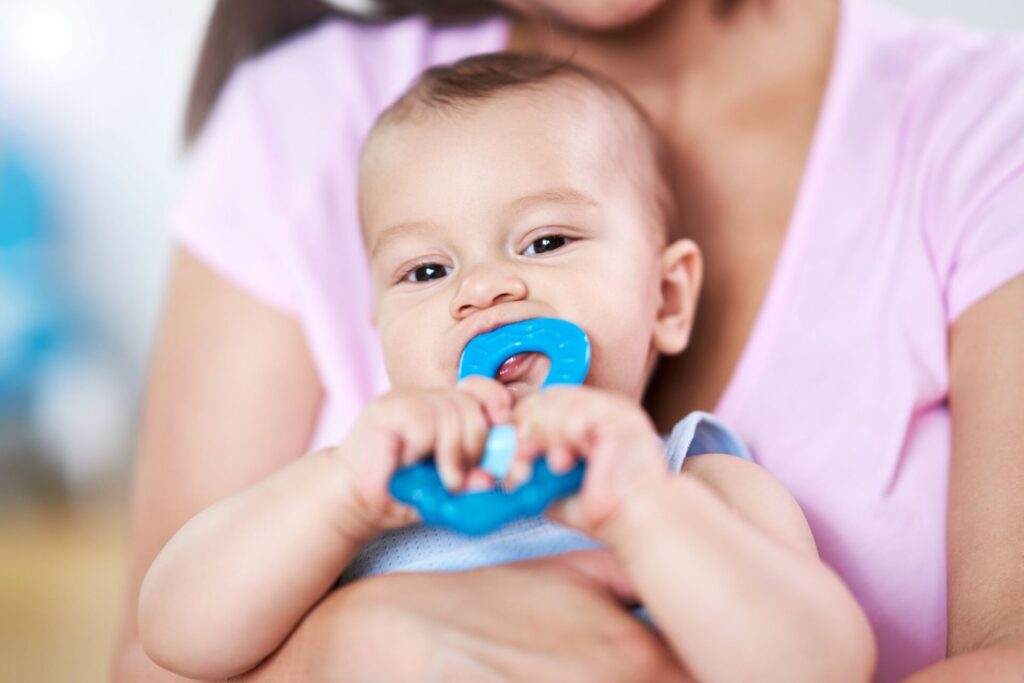As your little one grows, teething is one of the many milestones that we, as caregivers, get to support them through. It’s an exciting yet sometimes challenging time, both for babies and parents. Teething typically begins around six months of age but can start as early as three months or as late as one year. During this period, your baby might seem a bit fussier than usual, and that’s completely normal. We’re here to guide you through understanding what teething involves and how you can ease your baby’s discomfort.
This journey involves more than just the emergence of new teeth; it’s a critical phase where your baby’s dental health begins to take shape. Ensuring your baby’s comfort and maintaining good oral hygiene from the outset are crucial steps in promoting long-term dental health. Together, we will explore useful remedies to soothe sore gums and essential tips to keep those tiny teeth clean. Let us empower you with knowledge and practical tips to help your baby through their teething phase as comfortably as possible.
Understanding the Teething Process: What to Expect
Teething marks an important developmental stage where your baby starts to show the first signs of primary teeth through their gums. Typically, the two bottom front teeth emerge first, followed by the top front teeth. However, every child is unique, and the order and timing can vary greatly. Most children will have their full set of 20 primary teeth by the time they are three years old.
During this period, it’s common for your baby to experience some discomfort or irritability as each new tooth presses through the soft tissues of their gums. Other signs that indicate teething might include drooling more than usual, a slight rise in temperature (though not above a mild fever), and a tendency to chew on firm objects. Rest assured, these symptoms are normal and manageable with the right comfort measures. Knowing what to expect during teething can help you prepare to support your baby through this natural part of their growth.
Effective Home Remedies for Teething Discomfort
To help ease your baby’s teething pain, there are several effective home remedies you can use that are safe and soothing for your little one. Chilled teething rings or a cold washcloth for your baby to chew on can be particularly relieving. The cold can help numb the gums and reduce swelling, providing some comfort to your distressed child. Ensure these items are clean and cooled in the fridge (not frozen, as extreme cold can be harmful).
Additionally, gentle pressure from massaging the gums with a clean finger can offer significant relief. For older infants, hard, unsweetened teething crackers or a piece of peeled cucumber can also be satisfying to gnaw on. However, you must always supervise your baby to avoid any choking hazards. Over-the-counter remedies, like teething gels or drops, might be used under the guidance of a healthcare professional. These simple methods can make the teething process much more bearropolite and comfortable for both you and your baby.
When to Consult a Pediatrician About Teething
While teething is a natural process, there are occasions when it’s advisable to seek professional advice. If your baby appears particularly distressed or if the discomfort seems exacerbated, it could be a sign that something else is affecting their health. We recommend contacting us if your baby develops a high fever (above 38°C), severe and persistent crying, or signs of infection around the gums such as significant swelling, pus, or unusual redness. These symptoms are not typical of teething and may indicate a more serious condition requiring immediate attention.
Moreover, if you notice that the teething is unusually delayed—meaning no teeth have appeared by the age of 18 months—it’s a good idea to consult with us. We can assess if there are underlying health issues or developmental delays needing attention. Our guidance can provide you with peace of node and ensure that your baby’s health is monitored effectively throughout their teething stages and beyond.
Tips for Maintaining Healthy Oral Hygiene in Infants
Maintaining good oral hygiene from the start is critical in preventing dental problems later in life. Begin by cleaning your baby’s mouth even before their first tooth appears. You can gently wipe the gums with a clean, moist cloth or a gauze pad after feeds and before bedtime. This habit helps remove lingering sugars and bacteria and accustoms your baby to regular oral care.
Once the first tooth emerges, start using a baby toothbrush with soft bristles and a small, rice-grain-sized amount of fluoride toothpaste—no more than a smear. Brush gently twice a day, and as more teeth appear, make sure to brush them all. We recommend scheduling your baby’s first dental appointment with a paediatric dentist around their first birthday or after the first tooth is visible. This allows the dentist to check for any early signs of dental problems and discuss further oral hygiene practices to ensure your baby maintains a healthy smile.
Your Partners in Your Child’s Teething Journey
At Child Specialist in Vadodara, we’re here to support you and your baby every step of the way through the teething process. Understanding what to expect and how to handle the challenges of teething helps you better support your little one during this important developmental phase. Remember, if you ever have concerns about your baby’s teething or oral health, or need guidance on how to manage teething symptoms, don’t hesitate to get in touch with us.
Together, we can ensure that your baby’s first teeth are a cause for celebration, not stress. Let’s keep those tiny teeth healthy and those big smiles shining! If you require any assistance or advice, please contact Child Specialist in Vadodar; our pediatric clinic here to help ensure your child’s health and well-being.

